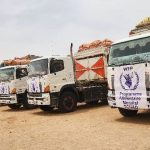The East African Community (EAC) Women’s Intergenerational Dialogue is set to take place Tuesday, July 2-3, 2024, at the EAC Headquarters in Arusha, Tanzania.
This historic event brings together women leaders from across the region to discuss challenges facing young women as they aspire for excellence in education, professional, and leadership development.
The dialogue under the theme: “Harnessing Intergenerational Dialogue to Galvanize Transformat Women Leadership in East Africa for Sustainable Peace and Development” aims to create a platform for young women to engage with senior women leaders from governments, parliaments, chil society, faith-based organizations, and continental and global institutions.
According to EAC, the event will foster a space for reflection, listening, and exchange of ideas on issues that concern young women, including their participation in leadership, peace, and governance.
The EAC Women’s Intergenerational Dialogue is a flagship initiative of the East African Legislative Assembly Women Caucus (EALA Women Caucus) in collaboration with Tengeru Institute for Community Development through Women Research and Documentation Center, EAC Secretariat and EALA Youth Caucus.
The event seeks to promote mentorship in leadership, peacebuilding, cross-intergenerational learning, communication, and sharing among women from diverse backgrounds.
This dialogue aims to bridge the gaps between generations and promoting a common agenda for women’s leadership and empowerment, amplify the voices of women of different ages, develop mentorship and coaching in leadership, and promote role modeling to nurture a generation of young women leaders in the East African Community
The dialogue will explore ways of ensuring greater engagement of young women in leadership, peace, and governance; and encouraging young women to analyze matters of local, regional, and global policy commitments, and creating a regional women’s leadership platform for peer-to-peer learning and sharing.
The event is expected to attract participants from governments, parliaments, civil society. organizations, faith-based organizations, foundations, private sector partners, academia, media, and selected representatives of young women from various thematic areas.




